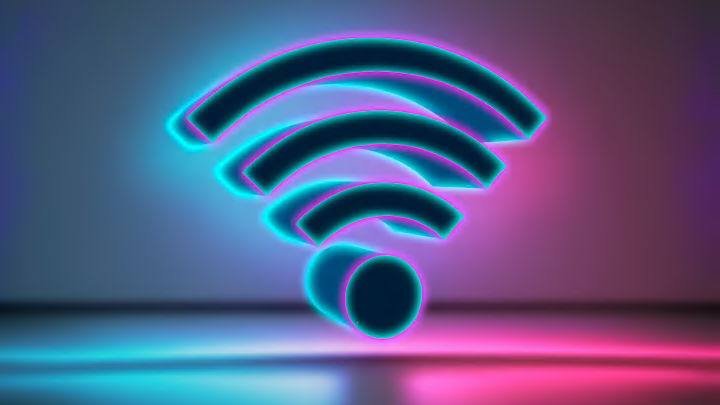You might have assumed, insofar as you’ve thought about it at all, that the Wi of Wi-Fi stands for wireless. And maybe you also assumed it couldn’t possibly be a coincidence that Wi-Fi rhymes with another tech term: hi-fi, i.e. high fidelity.
So the natural conclusion is that Wi-Fi probably stands for wireless fidelity. But does it?
What Is Wi-Fi?
Wi-Fi, in Verizon’s palatable layperson’s terms, “is the radio signal sent from a wireless router to a nearby device, which translates the signal into data you can see and use. The device transmits a radio signal back to the router, which connects to the internet by wire or cable.”
After the FCC released portions of the radio spectrum for general public use in 1985, the tech industry recognized a need to standardize wireless networking technology so it would work across various devices from various manufacturers. (Imagine, for example, how difficult things would be if your Amazon Kindle, your Dell desktop computer, your Samsung TV, and your Apple iPhone all required different networks in order to connect to the internet.) In 1997, the Institute of Electrical and Electronics Engineers (IEEE) finally rubber-stamped a wireless standard that would get the job done.
A conglomerate of companies then established a nonprofit called the Wireless Ethernet Compatibility Alliance (WECA) in order to implement this exciting new tech. The problem was that it was known as 802.11—or, more fully, IEEE 802.11b Direct Sequence—and that hardly rolled off the tongue. So WECA enlisted the marketing agency Interbrand to rename it.
What Does Wi-Fi Mean?
It was Interbrand that dreamed up the term Wi-Fi and the yin-and-yang logo that went with it. You wouldn’t be wrong for thinking that Interbrand must have drawn inspiration from the term hi-fi; it’s generally believed that they did, and that the Wi came from wireless. But, as the Oxford English Dictionary puts it, “Subsequent rationalization of this word as a shortening of wireless fidelity is spurious.”

The reason so many sources claim that Wi-Fi is short for wireless fidelity is partially WECA’s own doing. As WECA (which has since been rechristened the Wi-Fi Alliance) co-founder Phil Belanger told Boing Boing’s Cory Doctorow in 2005, “some of my colleagues were afraid … They could not imagine using the name ‘Wi-Fi’ without having some sort of literal explanation.” In other words, they didn’t seem to grasp how any brand name, no matter how catchy, could stand on its own if people didn’t understand what it meant.
So WECA’s six board members came up with a tagline, “The Standard for Wireless Fidelity,” which, according to Belanger, was used on everything from memos to merchandise for about a year after its creation. “This was a mistake and only served to confuse people and dilute the brand,” he said.
Needless to say, that early confusion hasn’t prevented Wi-Fi from flourishing. But you can see why it would cause confusion—because what exactly does wireless fidelity mean? High fidelity makes sense: In the 19th century, fidelity caught on as a way to refer to the quality of a transmission or reproduction, and high fidelity (as in good quality) gained popularity in the 20th century. You’d want telephone calls with high-fidelity sound and movies with high-fidelity images.
An argument could be made that wireless fidelity, then, describes the quality of a wireless transmission or connection. But asking people to rationalize their own way through a tagline is expecting a lot from any target audience. In short, trying to clarify the meaning of a made-up brand name with a tagline that uses made-up terminology isn’t all that clarifying.
If it were up to Belanger, we’d all erase the phrase wireless fidelity from our brains and simply take the word Wi-Fi at face value. “Wi-Fi doesn’t stand for anything,” he said. “It is not an acronym. There is no meaning.”
Discover What Other Abbreviations Mean Here:
